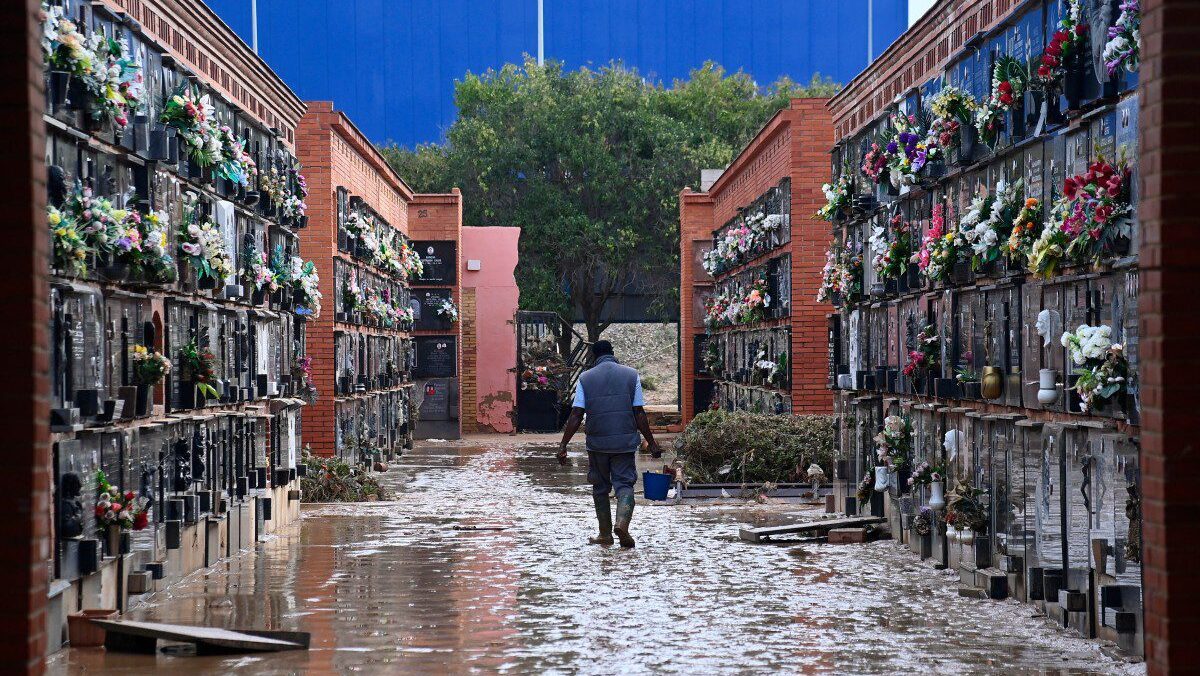
Photo: JOSE JORDAN / AFP
The death toll from the storms in Spain has risen to 158 with at least 250 people still missing. The latest figures come as the central government, led by Socialist Pedro Sánchez, and regional leaders, notably Carlos Mazón, president of the Valencian Community, are facing increasing criticism.
The Spanish Meteorological Agency (AEMET) issued multiple warnings early on Tuesday, escalating the alert level from orange to red in Valencia by 7:31 a.m., indicating life-threatening conditions. However, the Sánchez government has been criticised for its delayed response.
Despite warnings issued throughout Tuesday morning, federal government officials, including Sánchez and government spokeswoman Pilar Alegría, failed to address the severity of the situation in their public appearances. Alegría’s press conference that day focused on unrelated issues, such as Spain’s economic data and international relations, with no mention of the escalating crisis in Valencia. Sánchez, addressing the media from Bombay, also overlooked the looming disaster.
The government has since stated that the worsening situation was recognised early on Tuesday, pointing to AEMET’s warnings as proof of its response. However, the failure to communicate these warnings to the public has sparked outrage, leading opposition leaders to accuse the Sánchez administration of negligence.
Carlos Mazón—the Valencian leader who is from the opposition centre-right Partido Popular (PP)—has also faced criticism for his response. While Valencia was under red alert by early Tuesday, Mazón’s comments at a press briefing around midday downplayed the severity, suggesting that the storm would soon subside. His administration’s delayed emergency message, sent to residents at 8 p.m., added to the public perception that regional officials were slow to act.
The national conservative VOX party criticised Mazón for thanking Sánchez’s administration for its support during the crisis rather than condemning what it views as political opportunism by the central government.
Meanwhile, Argentina and El Salvador have offered humanitarian aid and specialist personnel. Libertarian Argentine president Javier Milei directed the White Helmets Commission, Argentina’s disaster relief agency, to support rescue operations in Valencia. El Salvador’s populist president Nayib Bukele committed 300 rescuers, paramedics, and 20 tons of essential supplies. The Spanish government, in response, announced that it would send an additional 500 soldiers to support relief efforts in the region, joining the 1,200 troops already deployed.
Sánchez visited Valencia on Thursday, where he faced vocal public dissatisfaction. Upon arrival and departure, he was greeted with boos and calls for his resignation from locals who accused his administration of mishandling the crisis. Amid the uproar, Sánchez told residents to remain indoors as more heavy rains are expected in the coming days.
The storm’s damage is extensive. Approximately 40,000 homes are without electricity, and major roadways remain blocked. Valencia’s rail connections, including its high-speed link to Madrid, are anticipated to be out of service for weeks. In Chiva, west of Valencia, Mayor Amparo Fort described the desperate conditions, noting that the town has been without power, water, and communication since Tuesday. She pleaded on national radio for supplies such as baby food and formula, highlighting the dire needs of isolated communities. In the aftermath, Valencia’s events arena has been repurposed as a temporary morgue, while the city’s primary forensic centre is working around the clock to process over 100 bodies.
Meanwhile, the political clashes continue. While Sánchez’s government insists that responsibility for local disaster management lies with regional authorities, the opposition contends that the central government failed to act decisively. Alberto Núñez Feijóo, leader of the PP, defended Mazón, arguing that regional leaders rely on the information provided by the central government’s agencies.
The storm, one of the deadliest in Spain’s recent history, has exposed vulnerabilities in the country’s disaster response abilities. With communities still submerged, rescue teams are racing against time to locate the missing, while politicians grapple with the fallout from their handling of the crisis.
The nation remains on high alert as weather agencies warn of further heavy rainfall, leaving residents and officials bracing for additional challenges in the days ahead.
